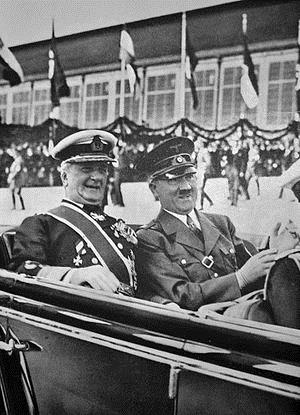During World War II, Hungary was a member of the Axis powers. In the 1930s, the Kingdom of Hungary relied on increased trade with Fascist Italy and Nazi Germany to pull itself out of the Great Depression. By 1938, Hungarian politics and foreign policy had become more stridently nationalistic. Hungary benefited territorially from its relationship with the Axis. Settlements were negotiated regarding territorial disputes with the Czechoslovak Republic, the Slovak Republic, and the Kingdom of Romania. In 1940, under pressure from Germany, Hungary joined the Axis. Although initially hoping to avoid direct involvement in the war, Hungary's participation soon became inevitable. In 1941, Hungarian forces participated in the invasion of Yugoslavia and the invasion of the Soviet Union.While waging war against the Soviet Union, Hungary engaged in secret peace negotiations with the United States and the United Kingdom. Hitler discovered this betrayal and, in March 1944, German forces occupied Hungary. When Soviet forces began threatening Hungary, an armistice was signed between Hungary and the USSR by Regent Miklós Horthy. Soon after, Horthy's son was kidnapped by German commandos and Horthy was forced to revoke the armistice. The Regent was then deposed from power, while Hungarian fascist leader Ferenc Szálasi established a new government, with German backing. In 1945, Hungarian and German forces in Hungary were defeated by invading Soviet and Romanian armies.Approximately 300,000 Hungarian soldiers and 80,000 civilians died during World War II and many cities were damaged, most notably the capital of Budapest. Most Jews in Hungary were protected from deportation to German extermination camps for the first few years of the war, although they were subject to a series of anti-Jewish laws which imposed limits on Jewish participation in Hungary's public and economic life. From the start of the German occupation of Hungary in 1944, Jews and Roma were deported to the Auschwitz concentration camp. By the end of the war, the death toll was between 450,000 and 606,000 Hungarian Jews and an estimated 28,000 Hungarian Roma. Hungary's borders were returned to their pre-1938 status after its surrender.




Aipatu
0